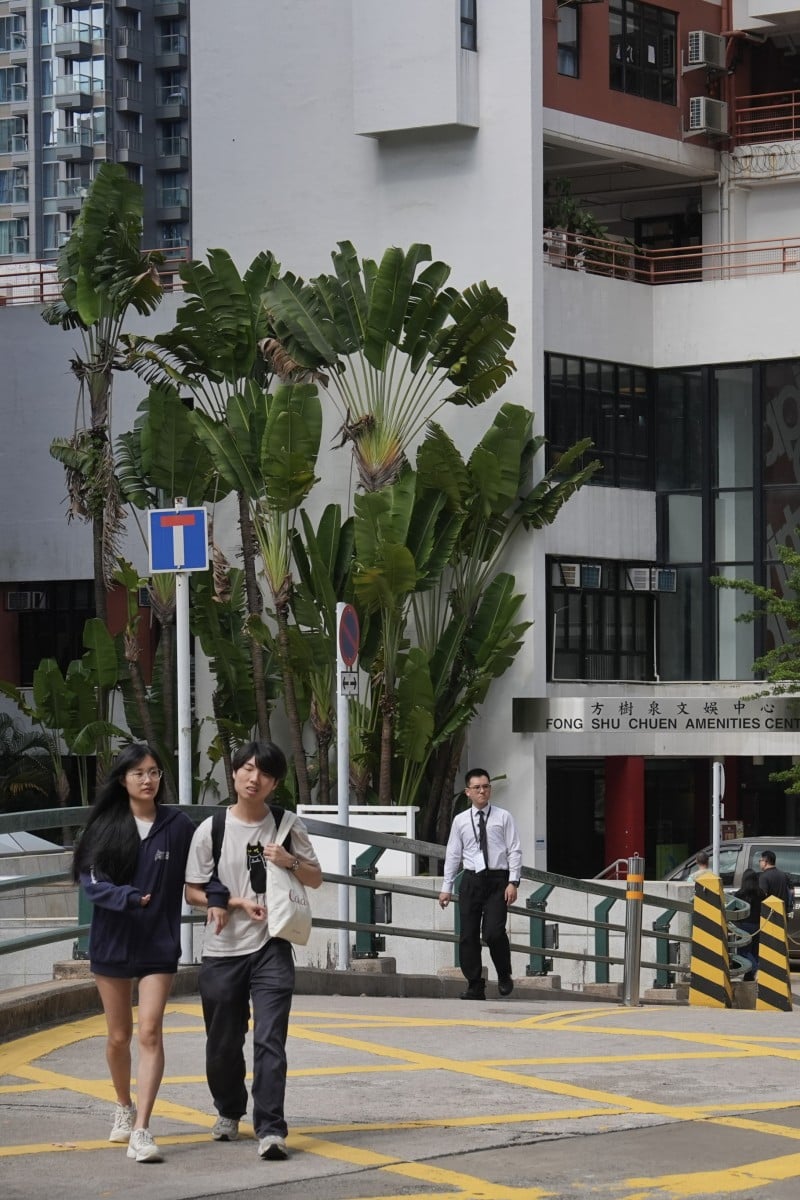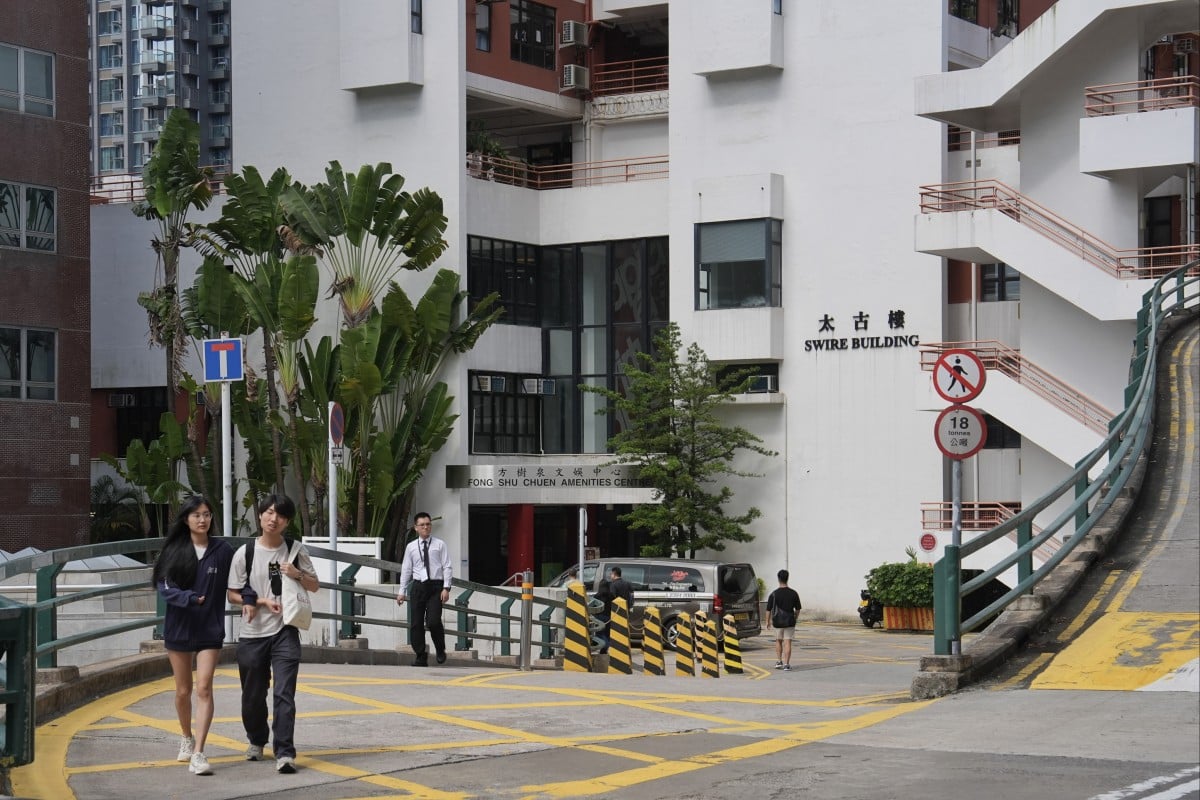
Deep Dive: Hong Kong’s student housing crisis means non-locals are desperate for flats
Non-local student enrolment is expected to continue increasing amid tensions with the US, Donald Trump’s tightened immigration procedures
 Students walk outside the Swire Building, a student residence at the University of Hong Kong. Photo: Elson Li
Students walk outside the Swire Building, a student residence at the University of Hong Kong. Photo: Elson LiDeep Dive delves into hot issues in Hong Kong and mainland China. Our easy-to-read articles provide context to grasp what’s happening, while our questions help you craft informed responses. Check sample answers at the end of the page.
News: Hong Kong’s non-local university students are desperate for housing
-
City has more than 100,000 full-time university students enrolled but only 40,600 hostel beds
-
Number of non-local students, mainly from mainland China, is expected to rise amid tensions with the US
Mainland Chinese student Corner Zhang, 18, is searching for a place to stay for his second year of university in Hong Kong after his application for campus housing was rejected.
He had a shared dormitory room for his first year at Baptist University in Kowloon Tong. However, the school has not assured him of accommodation for the new academic year, which begins in September.
Like other universities in the city, it does not have enough student housing for everyone who applies. Baptist University only guarantees housing to locals for a year and non-locals in their first year of study.
Students from mainland China make up most of the non-local students in Hong Kong. Their number is expected to rise amid tensions and tightened visa and immigration procedures in the United States since President Donald Trump began his second term in January.
One option Zhang is considering is renting a flat with other students outside Kowloon Tong. The neighbourhood is one of the most expensive residential areas in the city.
He paid around HK$2,700 (US$345) per month for his university room, and he expects his monthly rent to at least double. He will also have to pay more for transport and other living costs.
“I will have to work part-time doing food delivery,” he said. “I just want to find a place to stay with a decent roommate who won’t disturb my life or studies.”
Deep Dive: Few Hongkongers taking part in Greater Bay Area Youth Employment Scheme
According to the Education Bureau, for the 2024-25 academic year, the city’s eight publicly funded universities had 76,943 Hongkongers and 26,476 non-locals in full-time undergraduate and postgraduate research programmes.
However, these universities only offered around 40,600 hostel places. Although dormitory places grew by 15 per cent over the past decade, universities could not keep up with the overall growth in enrolment, particularly the sharp rise in non-local students.
Demand will likely continue to rise, as the cap on non-local enrolments for publicly funded institutions was doubled from 20 per cent to 40 per cent of local student places from the current academic year.
The need for accommodation is especially strong at Hong Kong’s self-financing universities, which rely on non-local students.
The number of local students in full-time self-financing undergraduate and postgraduate programmes in the current academic year fell 11 per cent to 37,260 from a decade ago. Meanwhile, the number of non-locals more than tripled to 49,734 from 11,476 in 2015-16, according to official data.
Staff writers
Question prompts
1. According to the information in News, which of the following are true?
(1) Zhang expects his monthly rent to double to HK$2,000 when he rents a flat.
(2) Hong Kong’s publicly-funded universities have around 40,600 hostel spots available.
(3) The city’s publicly funded universities had more than 26,000 non-locals enrolled in full-time undergraduate and postgraduate research programmes during the 2023-24 academic year.
(4) The number of non-local students in Hong Kong has doubled over the last 10 years.
A. (1), (2) only
B. (2), (4) only
C. (1), (4) only
D. (2), (3) only
2. Using News, list TWO issues that Zhang faces regarding housing.
3. What factors have contributed to the lack of student housing? Explain using News and your own knowledge.
Cartoon
Question prompts
1. What is being shown in this cartoon, and how does it relate to the information presented in News?
2. How might local students deal with the issue of housing differently from non-local students, and what resources might they have that non-locals don’t? Explain using News and your own knowledge.
Issue: Universities work with the private market to provide student housing
-
Students hoping to rent flats on their own face higher costs and overcrowding
-
Some investors have proposed converting hotels, commercial spaces into student hostels
Hong Kong university students making their own housing arrangements may find it challenging to rent in the private market.
Property agent Eric Chan, who focuses on homes in Sha Tin, near Hang Seng University, said most flat owners were not keen to rent to students, worrying that these young tenants would not look after the flat properly.
Owners would mark up the rent by as much as a third of their initial asking amount when renting to students, who often paid HK$6,000 per person to share a flat.
Some flats were overcrowded, he added. He knew of one where six students shared a three-bedroom home with one sleeping in the living room.
Property agency websites reviewed by the South China Morning Post showed rental listings aimed at students in Tai Po and Sai Kung, close to Education University and the University of Science and Technology, offering spaces as tiny as 70 or 80 sq ft in village houses.
Some universities are working within the private market to increase the supply of student housing.
The Technological and Higher Education Institute said it had 255 bed spaces and collaborated with a government-funded hostel to offer student housing. It was also working with a commercial partner to convert hotels and commercial buildings into student dormitories.
Deep Dive: Hong Kong’s Education Bureau cuts subsidised Primary One classes for two schools
Meanwhile, Hang Seng University said it was exploring expansion plans, including seeking government support to get land near its Sha Tin campus for accommodation. Universities may apply for additional sites for campus expansion if they provide strong justification and have specific proposals.
Professor Joshua Mok Ka-ho, provost and vice-president at Hang Seng University, said hostel life was an important part of university education. However, the tight supply made it impossible to guarantee housing.
As building dormitories would take years, the university also rented private space to offer short-term student housing quickly: “Working with the private sector to rent flats or beds from private student hostels is the most practical way for us,” Mok said.
Rosanna Tang, executive director and head of research at real estate service firm Cushman & Wakefield in Hong Kong, agreed that the private sector could help in the short term. She said investors had been asking about converting hotels into student accommodation for over a year, but suitable sites were no longer easily available.
Some potential sites had been bought for conversion, but owners of mid-market hotels were less keen to sell as their businesses improved after the Covid-19 pandemic.
She suggested that the government allow some commercial buildings to be converted into dormitories by streamlining the procedures involved, as current red tape meant taking two years to vacate a building, renovate it and apply for a hotel license.
Staff writers
Question prompts
1. According to the information in Issue, which of the following are true?
(1) Private market lodging aimed at students can be as small as 100 sq ft.
(2) Some flat owners won’t rent to students because they don’t think they can pay on time.
(3) Owners may mark up the rent by a third of their initial asking amount for students.
(4) Current government policies mean it can take two years to convert a commercial building into student housing.
A. (1), (2) only
B. (1), (3) only
C. (2), (4) only
D. (3), (4) only
2. Using Issue, name TWO ways universities are working to provide more student housing.
3. What could be done in the private sector to build more student housing, and what obstacles might investors and developers face? Explain using Issue, Glossary and your own knowledge.
Graph
Question prompts
1. Name TWO trends shown in the graph.
2. How does the information in the graph relate to the problems outlined in News and Issue?
Glossary
publicly funded universities: universities that get financial support from the Hong Kong government. They often have lower tuition fees and focus on research and accessibility. Hong Kong’s eight publicly funded universities are the University of Hong Kong, the Chinese University of Hong Kong, the Hong Kong University of Science and Technology, Polytechnic University, City University, Baptist University, Lingnan University, and the Education University of Hong Kong.
hostel: a place that provides inexpensive housing for students, workers, or travellers. It often includes shared or dorm-style rooms.
self-financing institutions: educational establishments that do not get direct government funding. Instead, they rely on tuition fees, donations, and other revenue sources. Hong Kong’s self-financed institutions include, but are not limited to, Hong Kong Metropolitan University, the Hang Seng University of Hong Kong, and Shue Yan University.
red tape: official rules and processes that often seem unnecessary and delay results
Sample answers
News
1. B
2. Zhang is from mainland China, and therefore, he has no family to stay with in Hong Kong. Like many other non-local students, his application for on-campus housing was rejected by his university. Therefore, he has to find lodging himself. Additionally, Zhang expects his monthly rent to double when he moves off-campus. Because of this rent increase, he said he will need to work part-time to make ends meet.
3. University students struggle to find housing partly because of the rise in non-local students. These non-locals do not have the luxury of living at home with their parents during university. They are forced to find housing because universities cannot provide accommodation for more than a semester or two.
In addition to having too many non-local students, there are also too few dorms or on-campus housing options available. This forces students to find alternate lodging. According to the Education Bureau, there were more than 100,000 full-time students in the 2024-25 academic school year, competing for around 40,000 hostel spaces. This means there simply aren’t enough spots to go around.
Cartoon
1. This cartoon shows many hands reaching for a wall that should be filled with keys to student dorms. However, there is only one key left on the board, and all the hands are vying for the same key. This represents the student housing problem presented in the news, as there are too many students and too few on-campus dorms.
2. Local students usually have the option of living at home during university. For some, this may be inconvenient if they live far away from their school, resulting in a longer commute. Still, it means they know they will have a home, and they can save money. Non-local students usually do not have this option. Therefore, they are forced to spend the extra money on lodging, which is often only guaranteed for a year at most. After that, they must find their own accommodation, which can be a challenge.
Issue
1. D
2. Metropolitan University is working with private operators to get hundreds of bed spaces for students. Additionally, they got hotel space in Hung Hom with another 400 beds. Some universities, like Hang Seng University, are seeking expansion plans from the government, which would allow them to acquire land. The Technological and Higher Education Institute is collaborating with government-funded hostels and working with commercial partners to turn hotels and commercial buildings into dorms for students. (accept all reasonable answers)
3. Investors and real estate developers in the private sector could concentrate on buying and renovating old commercial spaces and hotels, turning them into student housing. However, it can be tough to find suitable sites for projects like these – especially since owners of mid-market hotels are no longer keen to sell now that business has picked up after the Covid-19 pandemic. There is also a lot of red tape involved, and the process of buying a property, renovating it, and getting a hotel license can take around two years. (accept all reasonable answers)
Graph
1. The graph shows the number of local and non-local students at publicly funded universities in Hong Kong from the 2014-15 academic year to the 2023-24 academic year. The number of local students has increased slightly, by about 4,000 students. The number of non-local students has risen significantly, by nearly 8,000 students.
2. The information in the graph justifies many of the problems explored in News and Issue, wherein Hong Kong’s student population – particularly the non-local student population – is growing too quickly for universities to accommodate and create enough housing options to keep up.
